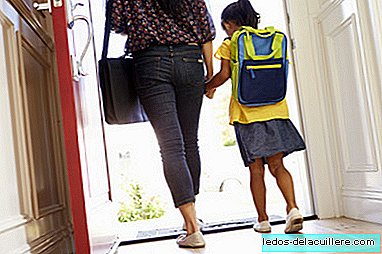
We have already reviewed in our Special Infant Feeding some of the main problems related to the feeding of our children: eating disorders, obesity, lack of appetite or rejection of certain foods. We think that they can usually be prevented with good guidelines established from home, and one of the most favorable habits is to make at least one meal together the whole family daily.
In addition to the appetites and eating habits of our children, in addition to their own attitudes, the distribution of activities throughout the day, and the adjustment of some of these to a certain schedule. It is very important that meals are kept within a few time slots that are more or less fixed, and that at the same time allow flexibility in special occasions.
We will review today of how meals are distributed and children's nutritional needs, to finish some recommendations to favor the autonomy of the little ones during meals.
General guideline to distribute meals during the course of a day:
Since our body tries to recover energy periodically, the most convenient is offer a supply of nutrients through four or five meals. In this way, something very important is avoided: children (especially during holiday periods) feel a need to eat continuously, and eat foods that are sometimes unhealthy, sometimes this happens without parents being aware.
When making four or five meals it is easier to maintain a healthy weight, eliminate the feeling of hunger, and get a nutritious and healthy diet
1.- Breakfast, is one of the three most important meals. We often don't spend enough time, and that alone should cover at least 25% of nutritional needs! When the day starts with an adequate reserve of energy, the diet is usually more balanced, and in addition in children and young people there has been a lower risk of being overweight when having a good breakfast. Setting the alarm clock for 15 minutes can help you to carry out all the organizational tasks, to get ready, and also to have breakfast properly, it is advisable to sit at the table all together, but it is not always possible during the week, so maybe we could take the first meal together Saturday or Sunday.
2.- In order to comply with the five meals, healthy alternatives should be sought for 'mid-morning' intake, this should take two hours of breakfast and two of the meal (at least). In principle, the snack would only be necessary in situations where they are going to 'burn those calories' with daily activities, so a child on vacation who is not also going to campsites would not need. So we will opt for a piece of fruit, a yogurt, a couple of corn pancakes, clean carrots and cut into strips or juices of natural fruits or vegetables.
Parents educate when we say and when we do without saying, we must be aware that children imitate us, and that includes our preferences, customs and habits. When parents bother to continuously offer different and quality foods, children are more likely to enjoy the great variety that the meals provide, coming to appreciate different flavors and textures
3.- Midday meal: in our culture it constitutes at the same time the most important food intake and for many families an opportunity to meet, so It is worth paying close attention. Interruptions are prohibited: television, computer, consoles, landlines and mobile phones, there will be time for inquiries or calls later. It is not healthy either to constantly scold children, if we want to correct a behavior, it will be enough to indicate it verbally, and remember it later gently, and even say it in the child's ear, but without violence. And it is not prohibited but It is inadvisable to prepare food at the last minute and distance the different dishes (First of second, single dessert plate, ...).
4.- SnackIt should be light and the absence of saturated fats (and trans-fatty acids), refined sugars and additives should be noted. The snack is taken at a time of day when the body needs to supplement food and nutrients (which have not been provided before). Snacking also helps to keep blood glucose levels, and not to get hungry for dinner eating copiously just when it is least recommended.
5.- Dinner: for families who have not been able to see each other during lunch, the opportunity comes with dinner. An occasion to tell us about what happened in the day, to see our faces and give us smiles. We must have dinner soon so as not to hurry to finish, and also to give the body time to do the digestion.
Although next week we will present a decalogue of Healthy Eating in childhood, today we wanted to remind you of some of the 'foods' that should not be present in the usual diet of children: commercial juices (with or without milk), soft drinks, breaded for frying, breakfast cereals with added sugar, chocolate or honey, chocolates, industrial pastries, and sweet / savory snacks
The American Heart Association has a 'guide to recommendations for the diet of children and adolescents' published on its page and translated by the Ministry of Education in the document 'Healthy Eating, Guide for Families', 2007. You have the summary table below,

Facilitate the autonomy and safety of children during meals:
How is it done?
First of all let's keep in mind that children need to grow and learn by adjusting to their own needs, although as we live in society, dads and moms will introduce them to the customs accepted by our culture, while we favor the acquisition of autonomy.
Utensils: It is convenient to introduce the spoon, fork and knife sequentially (by six or seven years many children can handle it perfectly). The fact that they get dirty or drop things is no reason to scold them, nor to give up.
Postures: also little by little they will learn to remain upright, not to put their feet on the chairs, elbows on the table, etc.
Everyone at the table: It is a good habit to sit all together and get up at the same time, so we encourage you to collaborate setting and removing the table.
Hygiene: hands wash before and after eating, teeth after (at least) breakfast and dinner. No food is thrown on the floor nor remains left on the table. It doesn't matter if someone drops things on the floor, but throwing food on the floor is disrespectful to the one who has prepared it.
Always remember the role that parents have in educating in all aspects surrounding meals. If you act with determination and patience, children will consolidate healthy eating habits with ease.












